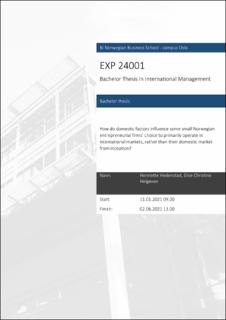| dc.description.abstract | The emergence of born globals (BGs), defined as firms that from, or near
founding obtain a substantial portion of total revenue from sales in international
markets, has increased during the past three decades. The phenomenon of such
firms that are heavily involved in exporting short time after establishment has
consequently received increased attention from scholars.
We identified a gap in the literature around how domestic factors influence BGs’
internationalization choices; previous research mainly focused on factors of the
foreign markets, and the firm’s internal factors. Based on this, we designed a
research question that reads as follows: How do domestic factors influence some
small Norwegian entrepreneurial firms’ choice to primarily operate in
international markets, rather than their domestic market from inception?
Initially, the thesis will present relevant literature for the topic of BGs. This
includes traditional internationalization theory, as well as a review of the existing
BG literature. Furthermore, the relevant research method and design are
presented. In the thesis, we used an exploratory design to gain a deeper
knowledge of how domestic factors influenced the BGs’ internationalization
choices. The method used in the thesis is a qualitative research method where we
obtained data through individual in-depth interviews. Two case studies were
selected: Platina Seafood Market, a firm in the seafood industry, and EpiGuard, a
firm in the medical technology industry. Both firms were established in the same
year and considered to be Norwegian BGs.
Prior to the in-depth interviews, an interview guide was designed to ensure
structure in the conduct of the interviews. The data obtained through the
interviews further formed the basis for the analysis.
Finally, relevant findings are discussed in the light of theory presented earlier in
the thesis, followed by a conclusion and recommendation section. We presented
three domestic factors which are argued to influence the BGs’ internationalization
choices. These were a lack of innovation adoption, large incumbents with market
power, and a small market size. Based on our analysis, we developed a model as
an attempt to fill the gap in the previous BG literature. This model illustrated how factors of the domestic market could make it difficult for small Norwegian
entrepreneurial firms to grow domestically, which consequently could lead them
to explore opportunities internationally. It is put an emphasis on the fact that such
factors should be seen in context with other external and internal factors, as the
choice to internationalize is characterized by complexity. | en_US |
